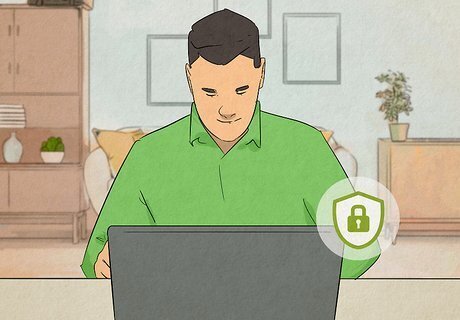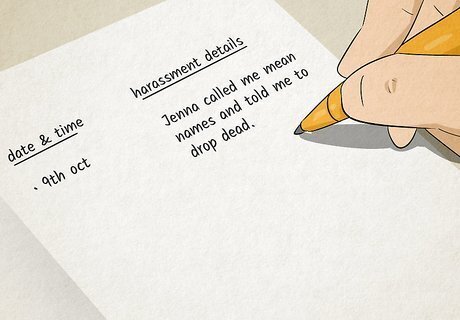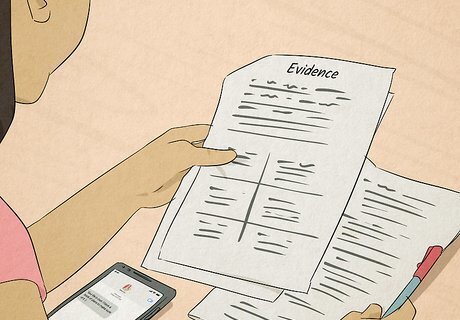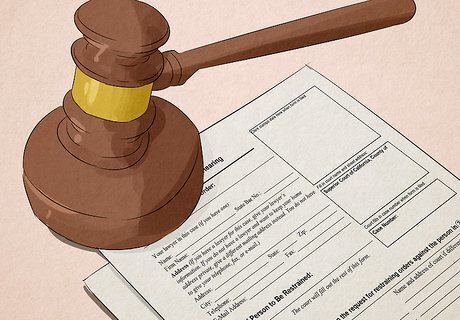
views
Assessing the Danger of Your Partner's Ex

Talk to your partner. If your partner's ex is harassing you, the most important thing is that both you and your partner are on the same page in terms of the behavior. You both should be in agreement that the behavior is inappropriate and constitutes harassment. Tell your partner about every instance of harassment, including when the behavior first started. Talk about the behavior together. If your partner is in denial about their ex's behavior, or doesn't think it constitutes harassment and that you should just "get over it," the two of you may want to seek the assistance of a professional counselor or a neutral third party to better understand each other.

Evaluate the past of your partner's ex. If your partner's ex has engaged in this behavior before, looking at what happened on those previous occasions can give you some insight into how seriously you should take it. For example, if your partner's ex has prior assault charges or similar brushes with the law stemming from similar harassment circumstances, you may want to go to the police sooner rather than later. On the other hand, if your partner's ex has exhibited this kind of behavior in the past, but it quickly fizzled out and they moved on, you may be better off just to ignore it as best you can.

Have patience. When handling harassment from your partner's ex, patience makes all the difference in keeping the situation from escalating further. If you get angry or confront your partner's ex, you may make the situation worse for everyone. Keep in mind that it is sometimes difficult to prove harassment, and authorities will be less inclined to see you as an innocent victim if you did anything to harass or egg on your partner's ex. Try to keep a cool head, and avoid responding or reacting to anything your partner's ex says or does.

Save everything related to the harassment. While the harassment is going on, even if you've decided that you're probably not going to involve authorities, you still need a record of everything that was written or said. If you're dealing with online harassment, create a screen capture of any posts or messages you see that are harassing – especially if your partner's ex has the ability to delete the messages. If you do decide to involve authorities, they may try to cover their tracks. While it may be tempting to delete harassing voicemail messages, emails, or texts, keep them on your phone so you'll have them in the event you decide to go to the police.
Standing Up to Your Partner's Ex

Take a stand against the behavior. You must let your partner's ex know that you feel their behavior constitutes harassment and it is unwelcome. Either you, your partner, or both of you together should express this to your partner's ex on no uncertain terms. Particularly in situations where your partner still must maintain contact with their ex, such as if they have kids together, it is best for you to present a united front. Then your partner can discuss what the boundaries are and what types of contact or communication are welcome to continue. Because they used to be together, your partner needs to be the lead in terms of establishing and maintaining rules for how their ex treats you. Your partner’s ex will be less likely to respect boundaries they know are set by you if they are already showing you disrespect. Keep in mind that your partner's ex may be acting from emotion rather than logic. They may feel hurt or betrayed, depending on the circumstances of the break-up. Be neutral and objective, and avoid making incriminating, threatening, or insulting statements.

Sit down and talk to your partner's ex. Provided you don't feel a threat to your safety or well-being, it typically is best to handle harassment from your partner's ex directly and rationally, before the situation goes too far. If possible, arrange for both you and your partner to sit down with your partner's ex. If you’re worried your partner's ex will feel as though you're ganging up on them, invite them to bring a friend or family member along for moral support. You might also consider finding a neutral third party, counselor, or mediator to sit down with the group of you and get to the bottom of the issues at hand and the reason for the harassing behavior. Come to this meeting with an open mind. Your purpose is not to confront your partner's ex, but to be open to them, understand the motivation for their behavior, and arrive at a resolution that works for everyone.

Block your partner's ex on social media. All social media platforms, such as Facebook or Twitter, have a means by which you can block an offensive account so that they can no longer contact you. Neither of you will see each other's posts or be able to access each other's pages after you block them. The biggest benefit to blocking someone on social media is the sense of ease that comes from the harasser being "out of sight, out of mind." However, in some cases it may not be that simple to get relief from harassment from your partner's ex – particularly if they still must remain in touch. Keep in mind that blocking your partner's ex on social media also does not mean that they can no longer post harassing or insulting things about you – it just means that you won't be able to see those posts. If your partner's ex regularly posted insults or digs at you on social media, make sure you're okay with not knowing about it or having the opportunity to speak up for yourself.

Update your online security. Your accounts, or those of your partner, may be at risk if your partner's ex had access to those accounts or the passwords. Make sure your partner has changed any passwords their ex might have known. Change your passwords to something that includes upper- and lower-case letters, numbers, and symbols or special characters, so it is not easy for your partner's ex to guess. You also want to change the password of your home wireless network, if you have one. Make sure you have the latest virus protection installed on your computer, with the most recent update.

Keep a journal of the harassment. In addition to preserving any evidence of the harassment, get a notebook where you can create an entry every time an incident of harassment takes place. This journal is especially important if you have little or no physical evidence of the behavior. Record your journal entry as soon as possible after the incident has taken place, so the facts will still be fresh in your mind. Write down every detail you can remember, no matter how mundane or seemingly irrelevant. Date and sign your entries so you have a record both of when the incident happened and when you wrote about it.
Taking Your Partner's Ex to Court

Organize your information. Before you go to authorities, you need to make sure you have all of your evidence together and that everything has been dated and labeled if necessary. Make physical copies of any digital evidence. Particularly if your partner's ex has been interfering with online accounts belonging to you or your ex, you still want to save the digital files – they may be helpful in the investigation. Make copies for your own records before you take any evidence or information to the police, including of your journal. They likely will want the originals, so you want to make sure you have copies just in case.

Go to the police. If you want to report harassment, go to the nearest local police station in person and tell them you want to file a police report. Do not call an emergency number for the police unless you feel your life is in imminent danger. Tell the officer who takes the report as many details as possible, and give them all the evidence you have as well as your journal.

Get a restraining order. If you simply want your partner's ex to leave you alone and stop contacting you, it may help to get a civil restraining order against them. Because the specific procedure varies, contact the clerk at your local courthouse to find out how to proceed. Keep in mind restraining orders often are categorized by your relationship (or former relationship) to your harasser. Domestic violence protections tend to be stronger than those for harassment by someone unrelated. If your partner's ex is also harassing your partner, you may want to get your partner to apply for the restraining order rather than you. Your partner can then list you as another member of the household to be protected by the restraining order. If you don't live with your partner, this option may not be available to you.

Consult an attorney. Depending on the response of the police, you may want to take additional legal action. This is especially true if the police have indicated to you that there won't be any criminal charges filed. You can do a search online to find attorneys in your area who work for victims of harassment or stalking. Most of them will give you a free initial consultation. If you decide to hire an attorney, interview at least three so you can compare and contrast to make the best choice.

Cooperate with authorities. Once you've filed your initial report, police or other investigators may have additional questions for you or may want to visit your home. Handle the situation by being as open and honest as possible. You may be asked some questions that you find offensive, or that make it sound as though you are being blamed for the harassment from your partner's ex. Try to stay calm and relaxed, and not get angry or indignant. If there's something that you don't understand, ask an officer about it. You may want to get answers to questions, especially about procedural matters, in writing. Keep all updated files, including the original police report, together with your copies of the evidence and your journal logging the harassing incidents.

File a lawsuit. As a last resort, you may be able to file a civil lawsuit to get compensation if the harassment from your partner's ex has caused specific losses in your life. Depending on where you live, you also may be able to get compensation for general pain and suffering. For example, if your partner's ex destroyed property that belonged to you, or spread rumors about you that caused you to lose a job or income in some way, you could sue them to recover your losses. If you think you might have a lawsuit against your partner's ex, consult an attorney as soon as possible. There are deadlines to file these lawsuits, which differ depending on the damages you want to claim. Most attorneys will give you a free initial consultation to assess your lawsuit and discuss your chances of success.


















Comments
0 comment